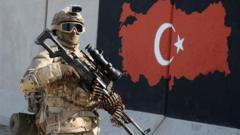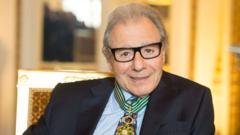On April 21, 2025, Pope Francis's health issues culminated in a stroke, followed by cardiac collapse, marking the end of his papacy amidst a backdrop of chronic health concerns.
Pope Francis Succumbs to Stroke After Health Complications

Pope Francis Succumbs to Stroke After Health Complications
Pope Francis passed away after suffering a stroke, exacerbated by pre-existing health conditions that complicated his illness.
In an official statement issued by the Vatican on Monday, it was confirmed that Pope Francis had died after suffering a stroke, which was complicated by a subsequent coma and eventual cardiocirculatory collapse. This devastating sequence of events highlights the frailty of the 88-year-old pontiff, who had been managing multiple health issues, including Type 2 diabetes and high blood pressure—both known to heighten the risk of stroke.
Francis had also lived with bronchiectasis, a serious lung condition that can lead to increased vulnerability to infections. Dr. Burton Dickey, a prominent pulmonary physician, noted that patients with bronchiectasis can face deteriorating respiratory conditions, which can escalate to pneumonia—a complication that Francis experienced during a recent hospitalization that lasted five weeks. Pneumonia can activate the formation of blood clots, thus increasing the likelihood of stroke.
The Vatican’s announcement indicated that the stroke prompted a "cardiocirculatory collapse," a situation where the heart and lungs cease to function effectively. Medical experts suggest that a stroke can disrupt the brain's control over heart activities or create pressure that leads to overall body shutdown. Often, a stroke can occur in conjunction with a heart attack—compounding the risk of cardiocirculatory failure.
As the world reflects on his legacy, the passing of Pope Francis leaves a profound impact on the Catholic community and beyond, invoking discussions on his contributions and the future of the papacy.
Francis had also lived with bronchiectasis, a serious lung condition that can lead to increased vulnerability to infections. Dr. Burton Dickey, a prominent pulmonary physician, noted that patients with bronchiectasis can face deteriorating respiratory conditions, which can escalate to pneumonia—a complication that Francis experienced during a recent hospitalization that lasted five weeks. Pneumonia can activate the formation of blood clots, thus increasing the likelihood of stroke.
The Vatican’s announcement indicated that the stroke prompted a "cardiocirculatory collapse," a situation where the heart and lungs cease to function effectively. Medical experts suggest that a stroke can disrupt the brain's control over heart activities or create pressure that leads to overall body shutdown. Often, a stroke can occur in conjunction with a heart attack—compounding the risk of cardiocirculatory failure.
As the world reflects on his legacy, the passing of Pope Francis leaves a profound impact on the Catholic community and beyond, invoking discussions on his contributions and the future of the papacy.





















